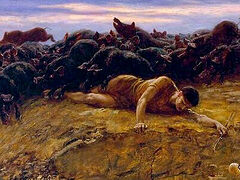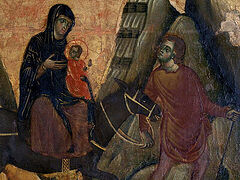Some Christians think that they believe in Christ and follow His teachings, but in fact they neither believe in Christ nor follow His teaching. If they truly believed, they would live by faith; but they don’t live the way Christ commanded. Whoever truly believes in Christ also believes in His word. But some Christians don’t quite believe His words: They believe in some, but not in others. For example, it’s said of our Lord Jesus Christ that He came to destroy the works of the devil, that He deprived him of his power and gave Christians a weapon against him—His Cross, before which the devil trembles and shakes, unable to bear to gaze upon its power. But some Christians don’t believe this. They’re ashamed of the Cross of Christ and don’t properly make the Sign of the Cross over themselves, but instead wildly flail their hand about, which arouses not fear in the demons, but laughter, because they don’t fear such flailing. This is what the great Church teacher St. John Chrysostom says about it.
And in our times, there are Christians who don’t even recognize the existence of demons at all, and thereby testify that they believe neither in Christ Himself, Who drove out demons, nor in the Holy Apostles, who were given such power over the impure spirits by Christ, nor in the teaching of the Church, which, through the Fathers and Church teachers, clearly depicts how evil and vile these spirits of malice are, and what trickery they use to seduce Christians.
The book of the ancient Fathers, called The Prologue, speaks about this. St. Niphon, who became a monk at a young age, lived a virtuous life in labors, fasting, vigil, and prayer. And he was vouchsafed to receive the gift of clairvoyance from God for such a life: He knew the secrets of human hearts, openly spoke with angels, and saw demons. Having built a church in honor of the Most Holy Theotokos, he converted many unbelievers to faith in Christ.
Unable to endure St. Niphon turning so many pagans away from his charms, the devil also plotted to turn Christians away from the Church. By demonic suggestion, some ludicrous games were organized in the city, and Christians started gathering there, leaving church. It was revealed to St. Niphon by the following vision what moral danger young Christians were facing. He saw satan, who, having turned his demons into men, sent them to the city in a large crowd. Some of the demons banged timbrels, others clanked, others played panpipes, and some wore masks.
This crowd went to the city to entertain and amuse the people. At the same time, St. Niphon saw the demons driving Christians to the games with iron rods, and others drew them with hooks driven into their hearts. And if any of the Christians paid these buffoons, their names were recorded and sent to satan, saying: “These Christians have now become your tributaries and will be condemned with us.” St. Niphon tearfully returned to church. When they asked him why he was so sorrowful, he told them: “Listen, brethren! Whoever has fallen in love with these games has fallen under demonic enticement.” After that, he forbade the demons, and they disappeared (The Prologue, December 23).
And note, brethren, the temptation that our cities and villages are exposed to, where they arrange traveling shows and circuses for empty and seductive spectacles. If The Prologue calls games with timbrels and farcical performances demonic, then what should we call the performances they put on in our traveling shows and other places made for entertaining spectacles?
The above story says that demons used timbrels, fifes, bells and whistles, and various ridiculous performances to seduce Christians, and doesn’t the same thing happen in our cities, and often enough in our villages too?
The demons organized such games there in order to distract Christians from the Church. Is it not for the same purpose that they organize similar performances here, and at a time when Christians are called to church for prayer? Is this not a profanation of the sanctity of the Lord’s days and of Christian worship, when the sounds of timbrels and other musical instruments, the cries of children’s voices, the applause of the audience of all ages are heard in entertainment halls at the same time when the faithful are called to prayer by the sound of bells in church, and when hymns of praise are sung in church in honor of Him Who abolished the devil’s charms with His Cross and granted joy to the world by His Resurrection?
In the above story it’s said that the devil envied the fact that the inhabitants of the city of Persin, having abandoned service to him, began to gather in church to pray and hear Christian teaching. Is it not out of the same envy that he arranges temptations for Christians in our cities and villages, where piety has noticeably begun to increase lately, where the people have started go to church and extra-liturgical talks more than before, and where they give their children soul-profiting books to learn to read and write?
In the above story it’s said that the demons wrote down the names of those Christians who paid minstrels for performances and sent these lists to satan as evidence against Christian on the day of the Dread Judgment.
May the lovers of spectacles who use their savings to pay actors fear this! Let them give the excess of their gains not into the hands of satan unto their reproof, as the story of the Fathers talks about, but to Christ the Savior, by the hands of elderly widows, infirm elders, and in general everyone who truly needs help, of which there are many among us.







